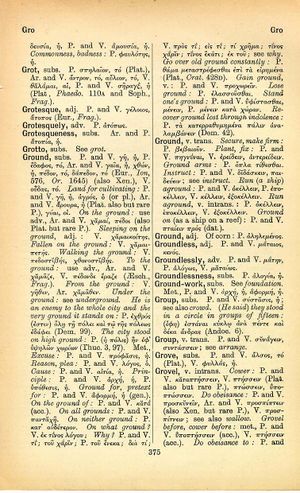ground: Difference between revisions
Ἀναξαγόρας δύο ἔλεγε διδασκαλίας εἶναι θανάτου, τόν τε πρὸ τοῦ γενέσθαι χρόνον καὶ τὸν ὕπνον → Anaxagoras used to say that we have two teachers for death: the time before we were born and sleep | Anaxagoras said that there are two rehearsals for death: the time before being born and sleep
(Woodhouse 3) |
(CSV4) |
||
| Line 1: | Line 1: | ||
{{ | {{Woodhouse1 | ||
| | |Text=[[File:woodhouse_375.jpg|thumb|link={{filepath:woodhouse_375.jpg}}]]'''subs.''' | ||
P. and V. γῆ, ἡ, P. [[ἔδαφος]], τό, Ar. and V. [[γαῖα]], ἡ, [[χθών]], ἡ, [[πέδον]], τό, [[δάπεδον]], τό (Eur., <b class="b2">Ion</b>, 576, Or. 1645) (also Xen.), V. [[οὖδας]], τό. | |||
<b class="b2">Land for cultivating</b>: P. and V. γῆ, ἡ, [[ἀγρός]], ὁ (or pl.), Ar. and V. [[ἄρουρα]], ἡ (Plat. also but rare P.), γύαι, οἱ. | |||
<b class="b2">On the ground</b>: use adv., Ar. and V. [[χαμαί]], [[πέδοι]] (also Plat. but rare P.). | |||
<b class="b2">Sleeping on the ground</b>, adj.: V. [[χαμαικοίτης]], | |||
<b class="b2">Fallen on the ground</b>: V. [[χαμαιπετής]]. | |||
<b class="b2">Walking the ground</b>: V. [[πεδοστιβής]], [[χθονοστιβής]]. | |||
<b class="b2">To the ground</b>: use adv., Ar. and V. [[χαμᾶζε]], V. [[πέδονδε]] ἔραζε (Aesch., <b class="b2">Frag.</b>). | |||
<b class="b2">From the ground</b>: V. [[γῆθεν]], Ar. [[χαμᾶθεν]]. | |||
<b class="b2">Under the ground</b>: see [[underground]]. | |||
<b class="b2">He is an enemy to the whole city and the very ground it stands on</b>: P. [[ἐχθρός]] (ἐστιν) ὅλῃ τῇ πόλει καὶ τῷ τῆς πόλεως ἐδάφει (Dem. 99). | |||
<b class="b2">The city stood on high ground</b>: P. (ἡ [[πόλις]]) ἦν ἐφʼ ὑψηλῶν χωρίων (Thuc. 3, 97). | |||
Met., <b class="b2">Excuse</b>: P. and V. [[πρόφασις]], ἡ. | |||
<b class="b2">Reason, plea</b>: P. and V. [[λόγος]], ὁ. | |||
<b class="b2">Cause</b>: P. and V. [[αἰτία]], ἡ. | |||
<b class="b2">Principle</b>: P. and V. [[ἀρχή]], ἡ, P. [[ὑπόθεσις]], ἡ. | |||
<b class="b2">Ground for, pretext for</b>: P. and V. [[ἀφορμή]], ἡ (gen.). | |||
<b class="b2">On the ground of</b>: P. and V. [[κατά]] (acc.). | |||
<b class="b2">On all grounds</b>: P. and V. [[πανταχῆ]]. | |||
<b class="b2">On neither ground</b>: P. κατʼ οὐδέτερον. | |||
<b class="b2">On what ground?</b> V. ἐκ τίνος λόγου; | |||
<b class="b2">Why?</b> P. and V. τί; τοῦ χάριν; P. τοῦ [[ἕνεκα]]; διὰ τί; V. πρὸς τί; εἰς τί; τί [[χρῆμα]]; τίνος χάριν; τίνος [[ἕκατι]]; ἐκ τοῦ; see [[why]]. | |||
<b class="b2">Go over old ground constantly</b>: P. θάμα μεταστρέφεσθαι ἐπὶ τὰ εἰρημένα (Plat., ''Crat.'' 428D). | |||
<b class="b2">Gain ground</b>, v.: P. and V. προχωρεῖν. | |||
<b class="b2">Lose ground</b>: P. ἐλασσοῦσθαι. | |||
<b class="b2">Stand one's ground</b>: P. and V. ὑφίστασθαι, μένειν, P. μένειν κατὰ χώραν. | |||
<b class="b2">Recover ground lost through indolence</b>: P. τὰ κατερρᾳθυμημένα [[πάλιν]] ἀναλαμβάνειν (Dem. 42). | |||
'''v. trans.''' | |||
<b class="b2">Secure, make firm</b>: P. βεβαιοῦν. | |||
<b class="b2">Plant, fix</b>: P. and V. πηγνύναι, V. ἐρείδειν, ἀντερείδειν. | |||
<b class="b2">Ground arms</b>: P. ὅπλα τίθεσθαι. | |||
<b class="b2">Instruct</b>: P. and V. διδάσκειν, παιδεύειν; see [[instruct]]. | |||
<b class="b2">Run</b> (<b class="b2">a ship</b>) <b class="b2">aground</b>: P. and V. ὀκέλλειν, P. ἐποκέλλειν, V. κέλλειν, ἐξοκέλλειν. | |||
<b class="b2">Run aground</b>, v. intrans.: P. ὀκέλλειν, ἐποκέλλειν, V. ἐξοκέλλειν. | |||
<b class="b2">Ground on</b> (<b class="b2">as a ship on a reef</b>): P. and V. πταίειν [[πρός]] (dat.). | |||
'''adj.''' | |||
<b class="b2">Of corn</b>: P. ἀληλεμένος. | |||
}} | }} | ||
Revision as of 09:42, 21 July 2017
English > Greek (Woodhouse)
subs.
P. and V. γῆ, ἡ, P. ἔδαφος, τό, Ar. and V. γαῖα, ἡ, χθών, ἡ, πέδον, τό, δάπεδον, τό (Eur., Ion, 576, Or. 1645) (also Xen.), V. οὖδας, τό. Land for cultivating: P. and V. γῆ, ἡ, ἀγρός, ὁ (or pl.), Ar. and V. ἄρουρα, ἡ (Plat. also but rare P.), γύαι, οἱ. On the ground: use adv., Ar. and V. χαμαί, πέδοι (also Plat. but rare P.). Sleeping on the ground, adj.: V. χαμαικοίτης, Fallen on the ground: V. χαμαιπετής. Walking the ground: V. πεδοστιβής, χθονοστιβής. To the ground: use adv., Ar. and V. χαμᾶζε, V. πέδονδε ἔραζε (Aesch., Frag.). From the ground: V. γῆθεν, Ar. χαμᾶθεν. Under the ground: see underground. He is an enemy to the whole city and the very ground it stands on: P. ἐχθρός (ἐστιν) ὅλῃ τῇ πόλει καὶ τῷ τῆς πόλεως ἐδάφει (Dem. 99). The city stood on high ground: P. (ἡ πόλις) ἦν ἐφʼ ὑψηλῶν χωρίων (Thuc. 3, 97). Met., Excuse: P. and V. πρόφασις, ἡ. Reason, plea: P. and V. λόγος, ὁ. Cause: P. and V. αἰτία, ἡ. Principle: P. and V. ἀρχή, ἡ, P. ὑπόθεσις, ἡ. Ground for, pretext for: P. and V. ἀφορμή, ἡ (gen.). On the ground of: P. and V. κατά (acc.). On all grounds: P. and V. πανταχῆ. On neither ground: P. κατʼ οὐδέτερον. On what ground? V. ἐκ τίνος λόγου; Why? P. and V. τί; τοῦ χάριν; P. τοῦ ἕνεκα; διὰ τί; V. πρὸς τί; εἰς τί; τί χρῆμα; τίνος χάριν; τίνος ἕκατι; ἐκ τοῦ; see why. Go over old ground constantly: P. θάμα μεταστρέφεσθαι ἐπὶ τὰ εἰρημένα (Plat., Crat. 428D). Gain ground, v.: P. and V. προχωρεῖν. Lose ground: P. ἐλασσοῦσθαι. Stand one's ground: P. and V. ὑφίστασθαι, μένειν, P. μένειν κατὰ χώραν. Recover ground lost through indolence: P. τὰ κατερρᾳθυμημένα πάλιν ἀναλαμβάνειν (Dem. 42). v. trans. Secure, make firm: P. βεβαιοῦν. Plant, fix: P. and V. πηγνύναι, V. ἐρείδειν, ἀντερείδειν. Ground arms: P. ὅπλα τίθεσθαι. Instruct: P. and V. διδάσκειν, παιδεύειν; see instruct. Run (a ship) aground: P. and V. ὀκέλλειν, P. ἐποκέλλειν, V. κέλλειν, ἐξοκέλλειν. Run aground, v. intrans.: P. ὀκέλλειν, ἐποκέλλειν, V. ἐξοκέλλειν. Ground on (as a ship on a reef): P. and V. πταίειν πρός (dat.). adj. Of corn: P. ἀληλεμένος.

